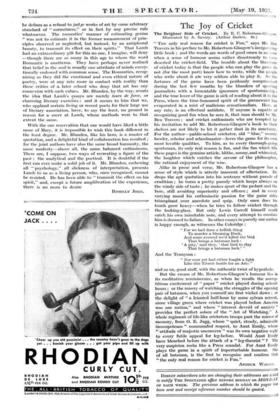The Joy of Cricket " THE only real reason for
cricket is Fun," says Mr. Ben Travers in his preface to Mr. Robertson-Glasgow's invigorating
little book ; and the words are words of good omen in an hour when a sense of humour seems rather disastrously to have deserted the cricket-field. The trouble about the literature of cricket today is that the people who can play the game do not (for the most part) know how to write, while the people who write about it are very seldom able to play it. So the fortunes of the game have been perilously compromised during the last few months by the blunders of sporting journalists with a lamentable ignorance of sportsmanship ; and the true lover of the game is sick of reading about it in the Press, where the time-honoured spirit of the greensward has evaporated in a mist of malicious sensationalism. Here, at any rate, is an effectual antidote. If anyone is capable of recognizing good fun when he sees it, that man should be Mr. Ben Travers ; and cricket enthusiasts who are tempted by his invitation to add Mr. Robertson-Glasgow's book to their shelves are not likely to let it gather dust in its sanctuary. For the author—public-school cricketer, old " blue," county bowler, scholar and schoolmaster—loves the game for its own most lovable qualities. To him, as to every thorough-going sportsman, its only real reason is fun, and the fun which fills
these pages is the genuine article, blithe, sunny, and whimsical, the laughter which. catches the savour- of the philosopher,
the rational enjoyment of the wise.
Alike in prose and verse, Mr. Robertson-Glasgow has a sense -of style -which is "utterly innocent of affectation. He drops the apt quotation into his sentence -without parade of erudition ; he turns a pretty parody which keeps always on the windy side of taste ; he makes sport of the pedant and the
bore, still avoiding superiority and offence ; and in every varying mood his enthusiastic passion for the game rides triumphant over anecdote and quip. Only once does his touch grow heavy—when he tries to follow cricket through the looking-glass. But only Lewis Carroll himself could catch his own inimitable note, and every attempt to emulate him is doomed to failure. In other essays in parody our author is happy enough, as witnesses the Coleridge :
" For we had done a hellish thing To murder a blooming. Duck,
And some averred we'd killed the bird That brings a batsman luck :
' A pity,' said they, ' that bird to slay That brings a batsman luck.' "
And the Tennyson :
" Nor over yet had either fought a fight Like this Titanic battle for an Ash:" and so on, good stuff, with the authentic twist of hyperbole. But the cream of Mr. Robertson-Glasgow's humour lies in
its meditative reminiscence, as when he recalls the surrep- titious excitement of " paper " cricket played during school- hours; or the misery of watching the struggles of the opening pair of batsmen, when you yourself are first wicket down ; or the delight of " a leisuied half-hour by some sylvan retreat, some village green where cricket was played before America was one nation," and where " interest devoid of anxiety " provides the perfect solace of the " Art of Watching." A Whole regiment of life-like cricketers troops past the mirror of memory, from 0. E. Jugg, whOse " quiet, steady, admirable incompetence " conunandcd respect, to Aunt Emily, whose
" attitude of majestic unconcern " was its own negative reply to every futile appeal for leg-before. Would Aunt Emily have blenched before the attack of a " leg-theorist " ? The very suspicion reeks like a Press scandal. For Aunt Emily plays the game in a spirit of imperturbable humour. She
of all batsmen, is the first to recognize and confirm that " the only real reason for cricket is Fun."
ARTHUR WAUG1t.














































 Previous page
Previous page